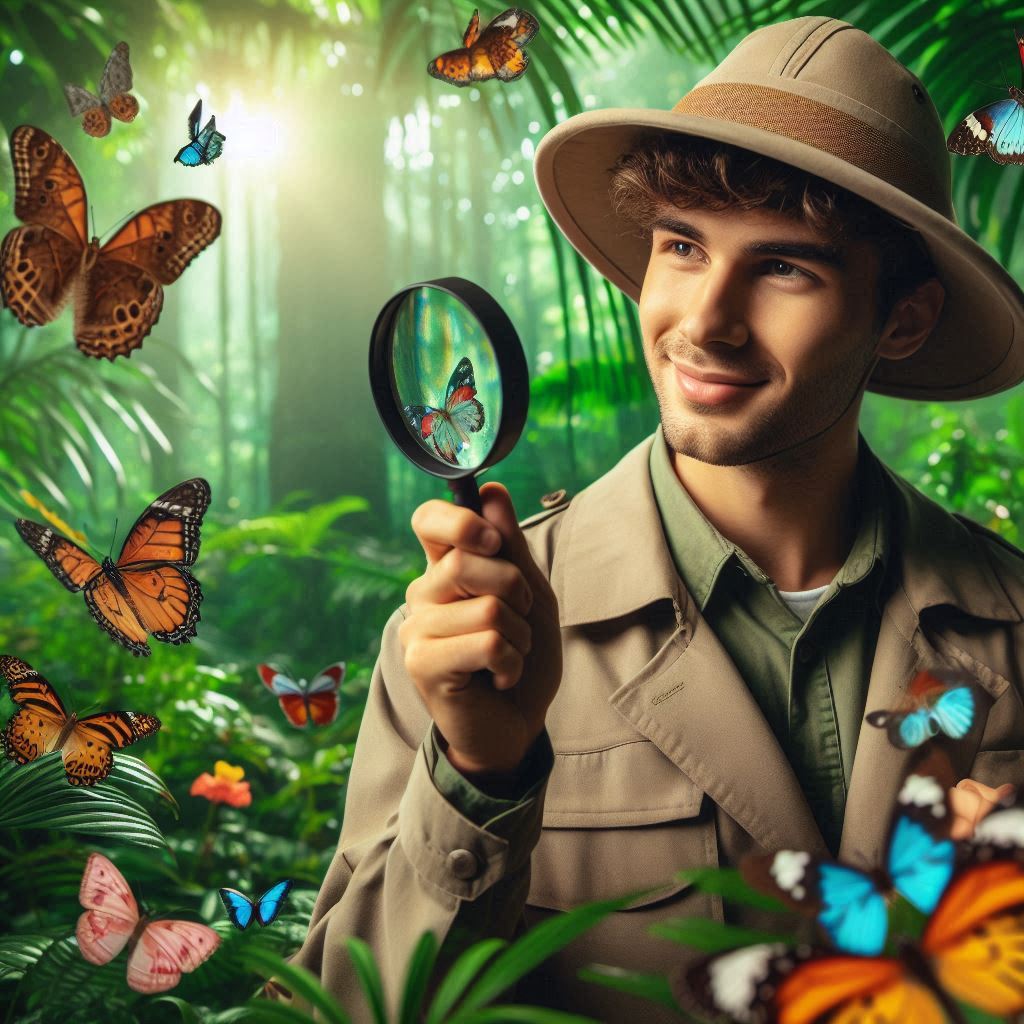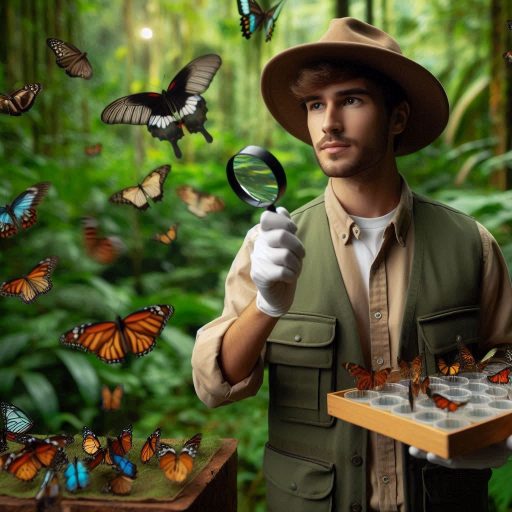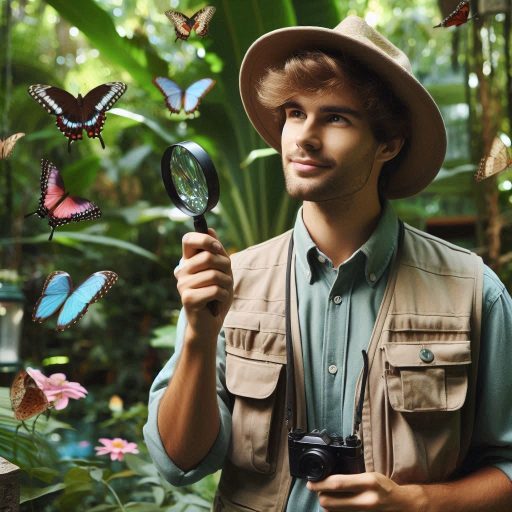Introduction
Zoologists study animals and their behaviors, contributing to our understanding of the natural world.
They work in various environments, including labs, field sites, and zoos.
Each setting offers unique opportunities for research, observation, and conservation efforts.
In laboratories, zoologists conduct experiments and analyze data to understand animal physiology and genetics.
Fieldwork allows them to observe animals in their natural habitats, gathering essential data on behavior and ecology.
Zoos provide a platform for research and education, where zoologists contribute to animal care and conservation programs.
Different work environments play a crucial role in shaping the skills and experiences of zoologists.
Each setting presents unique challenges and benefits that influence their research approaches.
Understanding these environments helps aspiring zoologists choose paths that align with their interests and goals.
Additionally, the variety of work environments fosters collaboration among zoologists, conservationists, and educators.
This collaboration enhances the effectiveness of research and conservation initiatives.
Ultimately, exploring various work environments enriches the knowledge and expertise of zoologists, preparing them for diverse career paths in the field.
Labs
Description of lab work for zoologists
Zoologists often conduct vital research in laboratory settings.
Laboratory work allows for controlled experiments and detailed observations.
In labs, researchers can study animal physiology, genetics, and behavior in a structured environment.
This controlled setting enables them to manipulate variables effectively, leading to precise results.
Zoologists use various techniques in the lab, including microscopy, DNA analysis, and behavioral experiments.
They might examine tissue samples, study cell cultures, or conduct experiments on live animals.
These methods provide insights into animal health, disease, and development.
Labs also facilitate the study of animal interactions at the molecular level.
Advantages of Working in a Lab Setting
One advantage of working in a lab is the ability to control environmental factors.
Researchers can adjust temperature, humidity, and light conditions to suit their experiments.
This control minimizes external influences that may affect outcomes, leading to more reliable data.
Additionally, working in a lab often provides a stable schedule.
Lab environments typically follow regular working hours, making it easier for researchers to maintain a work-life balance.
Another benefit of lab work is collaboration.
Researchers often work with a team of scientists, sharing knowledge and expertise.
This collaboration can foster innovative approaches to research problems.
It also allows for mentorship opportunities, which can be invaluable for early-career zoologists.
Skills and Equipment Needed for Lab Work
To succeed in a lab setting, zoologists need various skills.
Strong analytical skills are essential for interpreting data accurately.
Attention to detail is crucial when conducting experiments and recording results.
Effective communication skills also play a significant role, as researchers must present their findings clearly.
Moreover, proficiency in laboratory techniques is vital.
Zoologists should be familiar with standard laboratory equipment, such as centrifuges, spectrophotometers, and pipettes.
Understanding how to use these tools safely and effectively is essential for successful research.
Familiarity with software for data analysis is also necessary.
Programs like R, Python, and Excel are often used to analyze and visualize research data.
Being proficient in these tools can enhance a zoologist’s ability to draw meaningful conclusions from their work.
Laboratory work offers numerous advantages for zoologists.
It provides a controlled environment for research and fosters collaboration.
With the right skills and equipment, zoologists can conduct impactful research that advances our understanding of the animal kingdom.
The knowledge gained from lab work contributes significantly to conservation efforts and the overall field of zoology.
Read: Botany Career Fairs and Networking Events
Fieldwork
Definition of fieldwork for zoologists
Fieldwork is an essential component of zoological research.
It involves studying animals in their natural habitats.
Zoologists collect data on animal behavior, ecology, and interactions.
This hands-on approach provides valuable insights that lab work alone cannot achieve.
Conducting fieldwork allows zoologists to observe species in real-world settings.
They can monitor how animals respond to environmental changes.
Fieldwork also helps researchers understand species’ roles in ecosystems.
By gathering data in the wild, zoologists can draw more accurate conclusions about animal behavior.
Benefits of Conducting Fieldwork
One significant benefit of fieldwork is the opportunity for direct observation.
Researchers can witness animal behaviors and interactions first-hand.
This experience enhances their understanding of species and their environments.
Additionally, fieldwork helps zoologists collect data over time.
Longitudinal studies can reveal trends in animal populations and behaviors.
Fieldwork also promotes conservation efforts.
By studying endangered species in their natural habitats, researchers can develop effective management strategies.
Understanding species’ needs is critical for successful conservation initiatives.
Moreover, fieldwork often fosters collaboration with local communities and organizations.
These partnerships can enhance research efforts and promote awareness about conservation.
Challenges and Risks Associated with Fieldwork
Despite its benefits, fieldwork presents several challenges.
One significant challenge is the unpredictability of natural environments.
Weather conditions, terrain, and wildlife interactions can complicate research efforts.
Zoologists must adapt to changing situations while ensuring their safety and the safety of their subjects.
Fieldwork can also be physically demanding.
Researchers often trek through remote locations, requiring endurance and preparation.
They must carry equipment and supplies, which can be strenuous.
This physical aspect of fieldwork may not suit everyone.
Furthermore, researchers may encounter ethical dilemmas.
They must balance their need for data with the well-being of animal subjects.
It is crucial to conduct research responsibly and ethically, minimizing harm to wildlife.
Lastly, funding can pose a challenge for fieldwork projects.
Securing financial support for extended field studies can be difficult.
Researchers often rely on grants and sponsorships to cover expenses.
Fieldwork is vital for zoologists studying animals in their natural habitats.
It offers unique benefits, including direct observation and insights into animal behavior.
However, researchers must also navigate challenges and risks.
Despite these obstacles, the knowledge gained from fieldwork significantly contributes to the field of zoology and conservation efforts.
Read: Preparing for a Botany PhD: Tips and Advice
Zoos
Role of zoologists in zoos
Zoologists play a crucial role in zoos worldwide.
They contribute their expertise in animal behavior, health, and conservation.
In zoos, zoologists study animals in controlled environments.
This setting allows for detailed observations and research opportunities that are not possible in the wild.
Zoologists help design enrichment programs for animals.
These programs promote natural behaviors and improve animal welfare.
By studying how animals interact with their environments, zoologists create stimulating habitats.
They also monitor animal health and behavior to ensure the well-being of each species.
Importance of Zoos for Research and Conservation
Zoos serve as essential institutions for research and conservation efforts.
They provide a unique platform for studying endangered species.
By conducting research in zoos, zoologists can gather valuable data on animal biology and behavior.
This research informs conservation strategies and helps protect threatened species.
Moreover, zoos participate in breeding programs for endangered animals.
These programs help maintain genetic diversity and support species recovery efforts.
Zoologists collaborate with other institutions to ensure successful breeding outcomes.
These efforts are vital for preserving species at risk of extinction.
Zoos also engage in public education and outreach.
They raise awareness about conservation issues and the importance of biodiversity.
Through educational programs, zoos inspire visitors to care for wildlife.
Zoologists often participate in these initiatives, sharing their knowledge with the public.
Opportunities for Collaboration with Zoo Staff
Collaboration is key in zoo environments.
Zoologists work closely with zookeepers, veterinarians, and other staff members.
This teamwork enhances animal care and research efforts.
Each professional brings unique skills and perspectives to the table.
Zoologists can assist zookeepers in developing care protocols for various species.
They help ensure that animals receive appropriate diets, enrichment, and social interactions.
By collaborating, they can improve animal welfare and overall health.
Furthermore, zoologists often partner with veterinarians for health assessments.
They share knowledge about animal behaviors that may indicate health issues.
This collaboration helps create effective veterinary care plans.
Together, they can monitor animal health and respond to medical needs promptly.
Research initiatives in zoos can also benefit from interdisciplinary collaboration.
Zoologists can work with educators to create engaging learning experiences.
They can develop interactive exhibits that promote conservation awareness.
This partnership enhances the visitor experience while educating the public.
Zoologists play a vital role in zoos, contributing to research, conservation, and animal welfare.
Zoos provide essential opportunities for studying endangered species and promoting public education.
Collaboration with zoo staff enriches the overall mission of zoos.
By working together, zoologists and zoo professionals can ensure a positive impact on wildlife conservation and education.
Read: Interdisciplinary Research: Botany and Other Sciences

Comparison of work environments
Zoologists work in diverse environments, each offering unique experiences and challenges.
The three primary settings include labs, fieldwork, and zoos.
Understanding their contrasting features helps determine the most suitable environment for various research projects.
Contrasting Features of Labs, Fieldwork, and Zoos
Laboratories provide controlled environments for studying animal physiology and genetics.
In labs, zoologists can conduct experiments with precise variables.
This setting allows for replication and consistency in research findings.
However, lab work may limit the study of natural behaviors.
Fieldwork involves observing animals in their natural habitats.
This environment offers insights into animal behavior and ecology.
Zoologists can gather data on species interactions and environmental impacts.
Fieldwork is crucial for understanding animal adaptations.
However, it poses challenges like unpredictable weather and rugged terrains.
Zoos offer a hybrid environment that combines elements of both labs and fieldwork.
Zoologists can observe animals closely while ensuring their well-being.
They can study behavioral changes in a controlled yet naturalistic setting.
Zoos also provide opportunities for breeding and conservation research.
However, the controlled environment may limit observations of wild behaviors.
Transform Your Career Today
Unlock a personalized career strategy that drives real results. Get tailored advice and a roadmap designed just for you.
Start NowSuitability of Each Environment for Different Research Projects
The suitability of each environment depends on the research objectives.
Laboratories are ideal for experiments requiring precision and controlled variables.
Researchers investigating genetics or disease processes often choose lab settings.
Fieldwork suits projects focused on behavioral ecology or conservation biology.
It allows zoologists to study animals in their natural contexts.
Zoos are well-suited for research involving captive breeding and animal welfare.
They provide a unique opportunity to study behaviors in a managed setting.
Researchers can also assess the impacts of habitat changes on animal populations.
The choice of environment significantly influences the type of research conducted.
Impact of Work Environment on Zoologists’ Work-Life Balance
Each work environment impacts zoologists‘ work-life balances differently.
Laboratory work typically involves regular hours and predictable schedules.
This setting allows for a stable work-life balance.
Zoologists can plan their personal lives around their research commitments.
Fieldwork often requires long hours and irregular schedules.
Researchers may spend days or weeks in remote locations.
This unpredictability can disrupt personal lives and relationships.
The physical demands of fieldwork can also lead to fatigue.
In contrast, working in zoos offers a balanced approach.
Zoologists may have set hours while still engaging in diverse activities.
They can interact with the public, conduct research, and collaborate with staff.
This variety can enhance job satisfaction and promote a healthy work-life balance.
The choice of work environment for zoologists significantly affects their research and personal lives.
Laboratories provide controlled settings for precise studies, while fieldwork allows for natural observations.
Zoos offer a unique blend of both environments.
Understanding these contrasts helps zoologists choose the best setting for their research and maintain a balanced life.
Read: Women in Botany: Celebrating Pioneers and Leaders
Gain More Insights: The Role of Geologists in Natural Disaster Response
Personal Experiences
Zoologists often share fascinating stories about their experiences in different work environments.
These anecdotes reveal valuable lessons learned while conducting research in labs, fieldwork, and zoos.
Each environment shapes career paths and influences research interests in unique ways.
Stories from Zoologists in Different Environments
One zoologist working in a lab described the thrill of discovering a new genetic marker in a rare species.
This breakthrough opened doors to understanding species conservation better.
The controlled lab setting allowed for precise experimentation, leading to significant findings.
In contrast, a field biologist recounted the challenges of studying endangered birds in a remote rainforest.
She faced harsh weather and rugged terrain.
Despite the difficulties, she found joy in observing natural behaviors and interactions.
The experience deepened her passion for wildlife conservation.
A zookeeper shared a different perspective, emphasizing the importance of public education.
Working closely with animals, he developed programs to raise awareness about endangered species.
His experiences in the zoo environment fueled his desire to engage the community in conservation efforts.
Lessons Learned from Working in Labs, Fieldwork, and Zoos
Each environment teaches zoologists important lessons.
Lab work emphasizes the need for attention to detail and precision.
Researchers learn the value of reproducibility and accuracy in their findings.
This skillset is crucial for advancing scientific knowledge.
Fieldwork instills resilience and adaptability.
Zoologists must adjust their plans to cope with changing weather or animal behavior.
These experiences teach them to think critically and respond to unexpected challenges.
They also learn the significance of patience and persistence in wildlife research.
In zoos, zoologists gain insights into animal welfare and behavior.
They learn how to care for various species while conducting research.
Collaborating with veterinary staff enhances their understanding of health and conservation.
These experiences help shape their future research interests.
How Work Environments Can Shape Career Paths
The choice of work environment can significantly influence a zoologist’s career path.
Lab researchers may pursue academic or pharmaceutical careers.
Their focus often centers on genetic studies or disease research.
Many contribute to wildlife conservation through scientific discoveries.
Field researchers often transition into conservation roles or policy-making positions.
Their firsthand experience with endangered species shapes their perspectives on wildlife protection.
They may advocate for habitat preservation or work with non-profits to implement conservation strategies.
Zoo professionals frequently explore careers in education, outreach, or management.
Their experiences working with animals can lead to unique opportunities.
Many develop programs to engage the public and raise awareness about wildlife issues.
Personal experiences in various work environments significantly impact zoologists‘ careers and research interests.
Stories from labs, fieldwork, and zoos highlight valuable lessons learned.
Each environment offers unique opportunities for growth and exploration, shaping the future of zoological research and conservation efforts.
Uncover the Details: Soil Scientist Job Market Trends in the USA
Future Trends
Zoologists face an evolving landscape influenced by emerging technologies and changing environmental conditions.
These trends impact their work environments and research practices.
Understanding these developments is crucial for adapting to future challenges.
Emerging Technologies Influencing Work Environments
Innovative technologies are transforming zoology.
Remote sensing tools help researchers monitor animal populations without disturbing habitats.
Drones equipped with cameras capture images of wildlife in remote areas.
These tools enable extensive data collection while minimizing human impact.
Genomic technologies also reshape zoological research.
Next-generation sequencing allows for rapid analysis of genetic material.
Zoologists can identify species, study genetic diversity, and monitor health in populations.
This advancement enhances conservation strategies and informs breeding programs.
Artificial intelligence (AI) plays a significant role in analyzing large data sets.
AI algorithms can identify patterns in animal behavior or habitat use.
These insights guide conservation efforts and inform policy decisions.
Zoologists can leverage AI to make data-driven decisions quickly.
Potential Changes in the Field
The field of zoology is continually evolving.
Climate change poses significant challenges for animal habitats.
Zoologists must adapt to shifting ecosystems and changing species distributions.
This evolution may require new research methodologies and approaches to conservation.
Increased collaboration between disciplines is also on the rise.
Zoologists may partner with ecologists, environmental scientists, and technologists.
This interdisciplinary approach fosters innovation and expands research capabilities.
The convergence of knowledge enhances the effectiveness of conservation initiatives.
Importance of Adaptability and Flexibility
Adaptability and flexibility are essential traits for modern zoologists.
The ability to embrace change enables them to thrive in dynamic environments.
As technology and environmental conditions evolve, so must the skill sets of zoologists.
Zoologists may need to explore unconventional work environments.
These can include virtual laboratories, remote field sites, or collaborative research hubs.
Flexibility in work locations fosters creativity and enhances collaboration among professionals.
Continuing education and training will become increasingly important.
Zoologists should stay updated on technological advancements and research methodologies.
Participating in workshops or online courses can enhance their skills and knowledge.
Networking is another vital component for success in zoology.
Building relationships with professionals in various fields encourages collaboration and knowledge sharing.
These connections can lead to new opportunities and insights.
Future trends in zoology emphasize the importance of emerging technologies and adaptability.
Innovations like remote sensing, genomic technologies, and AI shape work environments.
Zoologists must remain flexible to navigate changes in the field effectively.
Embracing these trends will position them for success in their careers and contribute to effective conservation efforts.
See Related Content: Meteorology Internships: How to Find and Apply
Transform Your LinkedIn into a Job Magnet
Picture recruiters reaching out to you daily. We craft personalized LinkedIn profiles that stand out, boosting your visibility in ways others can't. Elevate your career now.
Upgrade NowConclusion
Zoologists work in various environments, including labs, field sites, and zoos.
Each setting offers unique experiences and learning opportunities.
In labs, zoologists conduct experiments and analyze data.
Fieldwork allows them to observe animals in their natural habitats.
Working in zoos combines research with education and conservation efforts.
These diverse opportunities shape the careers of zoologists.
Each environment contributes to a deeper understanding of animal biology and ecology.
Additionally, they enable zoologists to develop essential skills tailored to their career goals.
Aspiring zoologists should explore different work environments.
Doing so helps them gain a well-rounded perspective of the field.
Experience in labs, fieldwork, and zoos fosters adaptability and flexibility.
These qualities are crucial for success in the evolving landscape of zoology.
Ultimately, exposure to various settings enriches the learning experience.
It also helps budding professionals make informed career choices.
Exploring these environments can ignite passion and commitment to wildlife conservation.
Therefore, aspiring zoologists should embrace the diversity in their field and seize every opportunity for growth.




